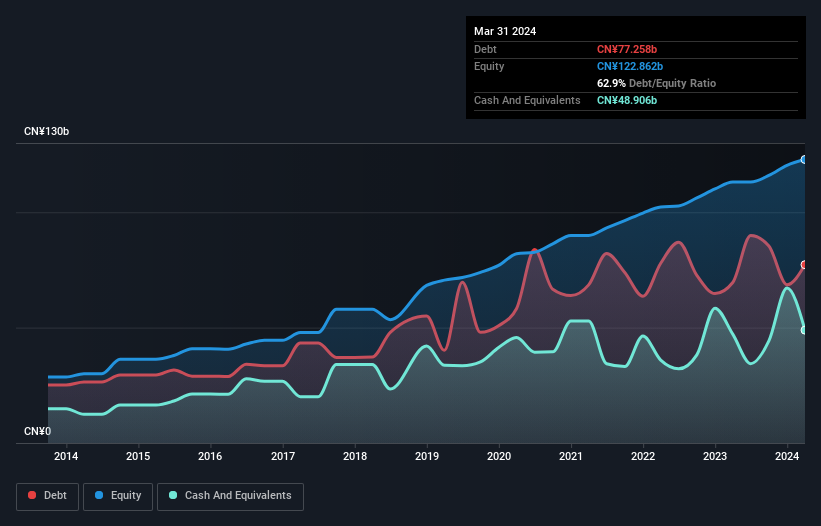- Hong Kong
- /
- Healthcare Services
- /
- SEHK:1099
Here's Why Sinopharm Group (HKG:1099) Can Manage Its Debt Responsibly

Howard Marks put it nicely when he said that, rather than worrying about share price volatility, 'The possibility of permanent loss is the risk I worry about... and every practical investor I know worries about.' So it seems the smart money knows that debt - which is usually involved in bankruptcies - is a very important factor, when you assess how risky a company is. As with many other companies Sinopharm Group Co. Ltd. (HKG:1099) makes use of debt. But the real question is whether this debt is making the company risky.
Why Does Debt Bring Risk?
Debt and other liabilities become risky for a business when it cannot easily fulfill those obligations, either with free cash flow or by raising capital at an attractive price. Part and parcel of capitalism is the process of 'creative destruction' where failed businesses are mercilessly liquidated by their bankers. However, a more frequent (but still costly) occurrence is where a company must issue shares at bargain-basement prices, permanently diluting shareholders, just to shore up its balance sheet. Of course, the upside of debt is that it often represents cheap capital, especially when it replaces dilution in a company with the ability to reinvest at high rates of return. When we examine debt levels, we first consider both cash and debt levels, together.
View our latest analysis for Sinopharm Group
What Is Sinopharm Group's Net Debt?
The image below, which you can click on for greater detail, shows that at March 2024 Sinopharm Group had debt of CN¥77.3b, up from CN¥69.6b in one year. However, it does have CN¥48.9b in cash offsetting this, leading to net debt of about CN¥28.4b.

How Healthy Is Sinopharm Group's Balance Sheet?
According to the last reported balance sheet, Sinopharm Group had liabilities of CN¥268.0b due within 12 months, and liabilities of CN¥22.2b due beyond 12 months. Offsetting these obligations, it had cash of CN¥48.9b as well as receivables valued at CN¥240.6b due within 12 months. So these liquid assets roughly match the total liabilities.
Having regard to Sinopharm Group's size, it seems that its liquid assets are well balanced with its total liabilities. So while it's hard to imagine that the CN¥53.0b company is struggling for cash, we still think it's worth monitoring its balance sheet.
In order to size up a company's debt relative to its earnings, we calculate its net debt divided by its earnings before interest, tax, depreciation, and amortization (EBITDA) and its earnings before interest and tax (EBIT) divided by its interest expense (its interest cover). Thus we consider debt relative to earnings both with and without depreciation and amortization expenses.
Sinopharm Group's net debt is only 1.2 times its EBITDA. And its EBIT easily covers its interest expense, being 10.5 times the size. So you could argue it is no more threatened by its debt than an elephant is by a mouse. But the other side of the story is that Sinopharm Group saw its EBIT decline by 5.8% over the last year. If earnings continue to decline at that rate the company may have increasing difficulty managing its debt load. There's no doubt that we learn most about debt from the balance sheet. But it is future earnings, more than anything, that will determine Sinopharm Group's ability to maintain a healthy balance sheet going forward. So if you're focused on the future you can check out this free report showing analyst profit forecasts.
But our final consideration is also important, because a company cannot pay debt with paper profits; it needs cold hard cash. So we clearly need to look at whether that EBIT is leading to corresponding free cash flow. In the last three years, Sinopharm Group's free cash flow amounted to 42% of its EBIT, less than we'd expect. That weak cash conversion makes it more difficult to handle indebtedness.
Our View
Happily, Sinopharm Group's impressive interest cover implies it has the upper hand on its debt. But truth be told we feel its EBIT growth rate does undermine this impression a bit. We would also note that Healthcare industry companies like Sinopharm Group commonly do use debt without problems. All these things considered, it appears that Sinopharm Group can comfortably handle its current debt levels. Of course, while this leverage can enhance returns on equity, it does bring more risk, so it's worth keeping an eye on this one. Another positive for shareholders is that it pays dividends. So if you like receiving those dividend payments, check Sinopharm Group's dividend history, without delay!
At the end of the day, it's often better to focus on companies that are free from net debt. You can access our special list of such companies (all with a track record of profit growth). It's free.
If you're looking to trade Sinopharm Group, open an account with the lowest-cost platform trusted by professionals, Interactive Brokers.
With clients in over 200 countries and territories, and access to 160 markets, IBKR lets you trade stocks, options, futures, forex, bonds and funds from a single integrated account.
Enjoy no hidden fees, no account minimums, and FX conversion rates as low as 0.03%, far better than what most brokers offer.
Sponsored ContentNew: Manage All Your Stock Portfolios in One Place
We've created the ultimate portfolio companion for stock investors, and it's free.
• Connect an unlimited number of Portfolios and see your total in one currency
• Be alerted to new Warning Signs or Risks via email or mobile
• Track the Fair Value of your stocks
Have feedback on this article? Concerned about the content? Get in touch with us directly. Alternatively, email editorial-team (at) simplywallst.com.
This article by Simply Wall St is general in nature. We provide commentary based on historical data and analyst forecasts only using an unbiased methodology and our articles are not intended to be financial advice. It does not constitute a recommendation to buy or sell any stock, and does not take account of your objectives, or your financial situation. We aim to bring you long-term focused analysis driven by fundamental data. Note that our analysis may not factor in the latest price-sensitive company announcements or qualitative material. Simply Wall St has no position in any stocks mentioned.
About SEHK:1099
Sinopharm Group
Engages in the wholesale and retail of pharmaceutical and medical devices and healthcare products in the People’s Republic of China.
Very undervalued with excellent balance sheet and pays a dividend.


